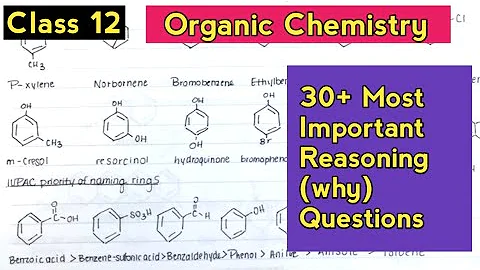Class 12 Organic Chemistry Important Reasoning Questions Answers
Author: Shriram Lamichhane
In this article, I will provide you Class 12 Organic Chemistry Important 'why?' questions solution. You can directly download the PDF of these questions answers and read them from your phone without internet. The best thing about it is, it contains all the important questions with their answers in a very simple way.
After you download this and study all the questions that are listed there, you don't need to read any other material to get mastery over reasoning questions asked from organic chemistry portion of Class 12 Chemistry.
I have carefully selected ALMOST ALL important and probable questions from whole organic chemistry as these questions answers are actually prepared by myself when I was in Grade 12 to get better marks. And, not to mention, I got A+ in chemistry in 12th board exam.
Download File
What does this Chemistry Questions PDF contain?
This PDF named " Class 12 Chemistry Important Reasoning Questions Answers" contains all the probably reasoning, give reason, 'why' type of questions which are generally asked from organic chemistry portion.
These questions are enough to study from organic portion. Important Reasoning Questions and Answers for Class 12 Organic Chemistry pdf can allow you to better understand the subject and its many concepts. The chapter-by-chapter Important questions for Class 12 Chemistry may help students improve their exam-taking skills.
Does this PDF contain answers to the questions as well?
Yes, this pdf has answers to all the questions which will help students to cope with the questions asked in examination. The download link will appear shortly after you click the Download button, so please be patient. You can see the preview while the timer keeps running.
How helpful is to students?
Chemistry Important Questions and Solutions PDF is available for download for students. You will be well-prepared for the Class 12 Chemistry exam by studying the answers of the important questions provided here. The board examinations are almost certain to include some of these questions. Class 12 students should take their time and carefully study this material.
It's not enough to only study for the class 12 Boards; students also need to prepare for competitive exams like the IOE, MBBS entrance exams etc. Consequently, they would benefit from preparing for both types of exams using Class 12 Chemistry important questions.
Are these questions relevant in New Syllabus of Class 12 Chemistry?
We came up with these answers by looking at the most recent course materials and materials. So these questions are up to date actually. A few previous year questions and questions from the previous year were also considered to recognize the importance level of the question by carefully studying the frequency level of the questions.
You can use these questions to test how well you understand important ideas from the Class 12 Chemistry curriculum, such as chemical equations, electron orbitals, and stoichiometry. Students can use these important Chemistry Class 12 Solutions to help them study for the final exams for Class 12.
What topics are important for Class 12 Chemistry exam from Organic Portion?
I have included the questions answers following the NEB syllabus for Class 12 very carefully. However, these questions are very well suited for India's CBSE syllabus too. The Class 12 organic chemistry important questions must cover the following topics:
Unit 8: Haloalkanes (8 hours)
- Introduction, nomenclature, isomerism, and classification of monohaloalkanes.
- Preparation methods from alkanes, alkenes, and alcohols.
- Physical and chemical properties, including SN1 and SN2 reactions.
- Various reactions such as formation of alcohol, nitrile, amine, ether, thioether, carbylamines, nitrite, and nitro alkane.
- Elimination reactions, reduction reactions, and specific reactions like Wurtz reaction.
Unit 9: Haloarenes (3 hours)
- Introduction, nomenclature, and isomerism.
- Preparation methods, physical properties, and chemical properties including low reactivity in nucleophilic substitution reactions.
- Specific reactions like Fittig and Wurtz-Fittig reaction, and uses of haloarenes.
Unit 10: Alcohols (7 hours)
- Introduction, nomenclature, isomerism, and classification.
- Preparation methods from haloalkane, primary amines, and esters.
- Industrial preparation methods and definitions of various types of alcohol.
- Physical and chemical properties, including reactions with HX, PX, PCl, SOCl, reactive metals, dehydration, oxidation, and esterification.
Unit 11: Phenols (4 hours)
- Introduction, nomenclature, and preparation methods.
- Physical properties and chemical properties, including acidic nature and specific reactions.
- Electrophilic substitution reactions and tests for phenol.
Unit 12: Ethers (2 hours)
- Introduction, nomenclature, classification, and isomerism.
- Preparation methods and physical properties.
- Chemical properties of ethoxyethane and uses of ethers.
Unit 13: Aldehydes and Ketones (10 hours)
- Introduction, nomenclature, and isomerism.
- Preparation methods from various compounds.
- Physical and chemical properties, including distinction tests and addition reactions.
- Specific reactions like aldol condensation, Cannizzaro’s reaction, Clemmensen’s reduction, and Wolf-Kishner reduction.
- Aromatic aldehydes and ketones, including preparation and properties.
Unit 14: Carboxylic Acids and Their Derivatives (9 hours)
- Introduction, nomenclature, and isomerism.
- Preparation methods and physical properties.
- Chemical properties and specific reactions like Hell-Volhard-Zelinsky reaction.
- Derivatives of carboxylic acids, including preparation, physical and chemical properties, and specific reactions like Claisen condensation and Hofmann bromamide reaction.
Unit 15: Nitro Compounds (3 hours)
- Introduction, nomenclature, and isomerism.
- Preparation methods and physical properties.
- Chemical properties and specific reactions, including uses of nitro-compounds.
Unit 16: Amines (7 hours)
- Introduction, nomenclature, classification, and isomerism.
- Separation methods and preparation of primary amines.
- Physical and chemical properties, including basicity and specific reactions.
- Aromatic amines, including preparation, physical properties, chemical properties, and uses.
Unit 17: Organometallic Compounds (2 hours)
- Introduction, general formula, and examples.
- Nature of the metal-carbon bond.
- Preparation and reactions of Grignard reagent.
Video Solution from YouTube:
Download PDF to Read Offline
Please wait..
